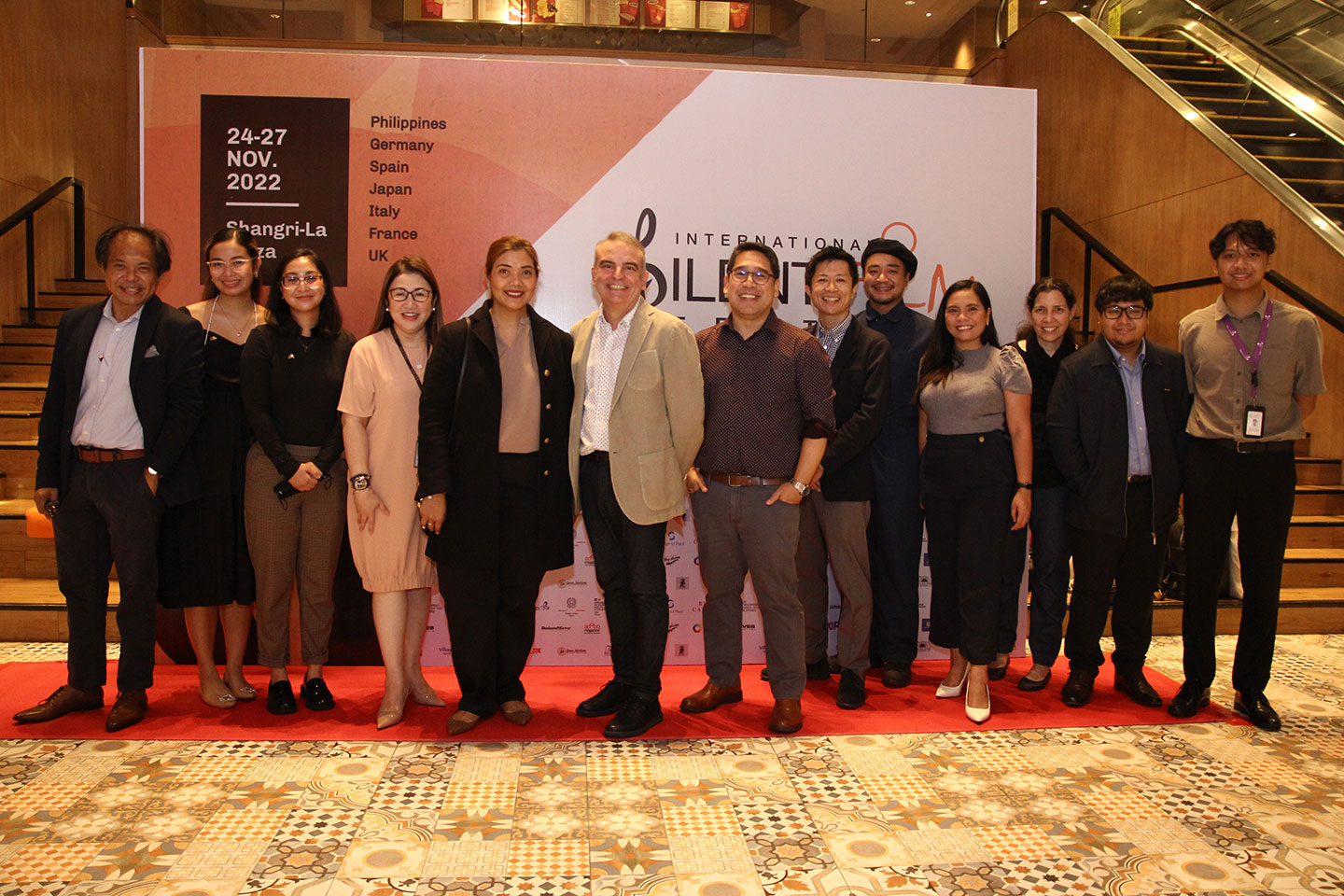MANILA, PHILIPPINES — After two years of online film screenings and activities, the annual International Silent Film Festival Manila (ISFFM) is now back with in-person festivities in celebration of 16 years of reliving rich silent film culture worldwide.
This year’s serving will be joined by the Embassy of France to the Philippines, Goethe-Institut Philippinen, Embassy of Italy in Manila with the Philippine Italian Association, The Japan Foundation, Manila, Film Development Council of the Philippines, Instituto Cervantes de Manila, and the British Council in the Philippines. Live scored by selected Filipino bands and musicians, silent films will be screened from November 24-27, 2022, at the Red Carpet, Shangri-La Mall, Mandaluyong City.

Sharing the Toast: The Four-Day Silent Film Experience
Signaling the start of its annual toast, 16th ISFFM’s invitational opening ceremony is hosted by the British Council in the Philippines. Accompanied by performances and cocktails at the Grand Atrium of Shangri-La Mall at 6:00 pm, this function will be graced by dignitaries from partner cultural organizations, film experts and critics, academicians, and guests.
The screening of British film Piccadilly at Red Carpet Cinema 1 will follow at 8:00 pm. Live scored by Filipino band Anahata in collaboration with Sensoria, this 1929 silent film tells a story about a scullery maid in a fashionable London nightclub whose sensuous tabletop dance catches the eye of a suave club owner. Piccadilly is regarded as one of the pinnacles of British silent cinema.

The festival’s second day will be started by a webinar spotlighting the representative films for this season. The organizations will be sharing their processes of restoration, curation, and the continuing impact of the films in their countries’ cinema history. Through Zoom, the webinar will be open to the public.
Back at the Red Carpet Cinema 1, German and French films will be shown starting 5:00 pm.
The 1922 German film Nosferatu: A Symphony of Horror, scored by The Brockas is the first cinematic adaptation of “Dracula.” Set in Transylvania, Nosferatu shares realtor Hutter’s story of entering a contract with Count Orlok, who is later known to be a vampire and will bring tragedy, plague and death to the port city of Wisborg. A thrilling cine-concert experience awaits viewers of this film.
Charles Burguet and René Le Somptier’s 1919 French piece La sultane de l’amour (The Sultan of Love – A Thousand and One Nuits) is this year’s oldest classic film. Starred by France Dhélia, Sylvio De Pedrelli and Yvonne Sergyl, this is an orientalist fairytale of the tormented love of Princess Daoulah and Prince Mourad, who met as disguised girl of the people and poor fisherman, and who could not find each other. The princess is later coveted by the sinister Sultan Malik, assisted by the fearsome Kadjar. This classic will be scored by Bras Pas Pas Pas.

Festival’s day three opens a round table discussion led by musicians sharing their expertise, tips and experiences in scoring their assigned films. The film seminar will happen at the Premiere Theater at 3:00 pm.
At 4:00 pm, Spain’s 1926 film Malvaloca will be shown, scored by Talahib People’s Music. A story of Rosita, the Malvaloca’s journey of finding her love, the silent film was considered lost and after its partial restoration, premiered at the 2010 Malaga Festival for the first time since the 1920s.
Japanese film 淑女と髯 (The Lady and the Beard) will follow at 8:00 pm, with musical score by Bullet Dumas. This 1931 film, known to be a commercially and critically-acclaimed masterpiece by the world renowned filmmaker Yasujiro Ozu, follows Okajima, a conservative and self-conscious student, unable to find work and love because of his magnificent beard, who then saves a young girl from a gang of ruffians. At her suggestion, he shaves his beard off and experiences surprising success.
Organized by the Film Development Council of the Philippines, event day four will witness a roundtable discussion on the challenges in the restoration of Philippine films led by local film archivists at 1:00 pm.
Ubaldo Maria Del Colle’s I Figli Di Nessuno (Nobody’s children), Italy’s representative film, is scheduled at 3:00 PM. This 1921 film based on a popular Italian novel from the turn of the 20th century, Nobody’s Children by Ruggero Rindi, is a tale of lovers thwarted by class differences, of illegitimate children and denied parental recognition. Although it encountered some problems with the censorship for denouncing children’s labor in the mines as well as for bringing to the big screen the workers’ strikes, I Figli Di Nessuno became a successful film for both producer Gustavo Lombardo and the leading actress Leda Gys.
At 7:00 pm, the 16th International Silent Film Festival will come into close. Celebrating the success of its face-to-face comeback, the closing ceremonies will be filled with colors and music. The Film Development Council of the Philippines will be leading the ceremonies.
 The night will be wrapped up by the screening of three of the best short silent films from the 2021 Mit Out Sound (MOS): International Silent Film Competition organized by the Film Development Council of the Philippines: Ing Tianak, Alingasngas ng mga Kuliglig, and Dikit, with music played by the BConcept and Vincent Del Rosario.
The night will be wrapped up by the screening of three of the best short silent films from the 2021 Mit Out Sound (MOS): International Silent Film Competition organized by the Film Development Council of the Philippines: Ing Tianak, Alingasngas ng mga Kuliglig, and Dikit, with music played by the BConcept and Vincent Del Rosario.
EJ Gagui and Marienel Calma’s animated short film Ing Tianak is set in an almost-urban town beset by the myth of a mysterious creature, a wife who suffered a miscarriage and a young woman who is forced into hiding seek redemption. In the process, they are forced to confront the same monster.
Vahn Pascual’s Alingasngas ng mga Kuliglig (Gossips of the Cicadidae), which won Best Film, is a story of Agapito, a naive teenage boy living with his persuasive machismo father, Mang Pedring, in a far-away mountain province. Mang Pedring wants Agapito to follow his footsteps in being a folk healer, also known as albularyo. But later on, in the course of Agapito’s transition in becoming the next folk healer of their town, he met a tikbalang. And in this moment, Agapito feels the love that he’s longing for a long time which also lets him realize that he’s trapped, because of his father, in a patriarchal and very conservative upbringing household and he wants to leave it all behind.
Lastly, Gabriela Serrano’s Dikit, in which she won as Best Director and also as Best Film, is loosely based on a lost silent film by Jose Nepomuceno. It reimagines classic Philippine folk horror into a contemporary diptych of feminine bodies, rage, and freedom. Living in isolation and yearning for human connection, this film is about a woman afflicted with a dark curse who develops an obsession with her new neighbors, a young couple with a secret of their own. As the days pass, she begins to witness happenings between them that ultimately force her to confront her nature, and perhaps save a life in the process.
The 16th International Silent Film Festival Manila is organized by Embassy of France to the Philippines, Goethe-Institut Philippinen, Embassy of Italy in Manila, The Japan Foundation, Manila, Film Development Council of the Philippines, Instituto Cervantes de Manila, and the British Council in the Philippines, in partnership with Philippine Italian Association, Shangri-La Properties, Inc., and 2Lives Creatives, Events and Media, Inc.
For more information on the schedule and inquiries, please check this Facebook Page: www.facebook.com/InternationalSilentFilmFestivalManila









